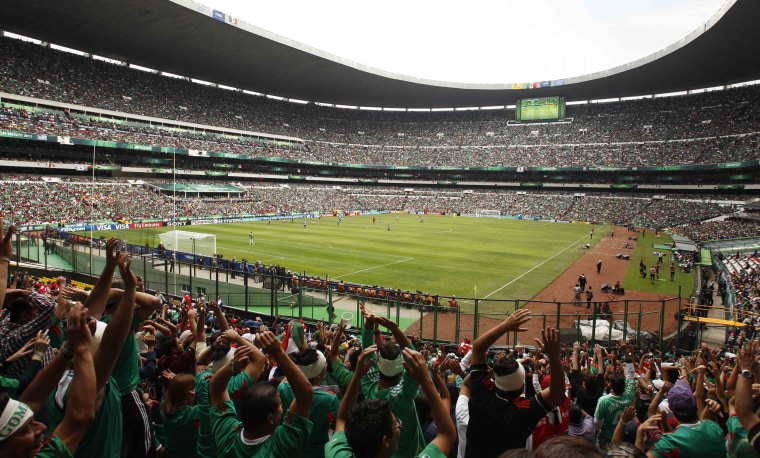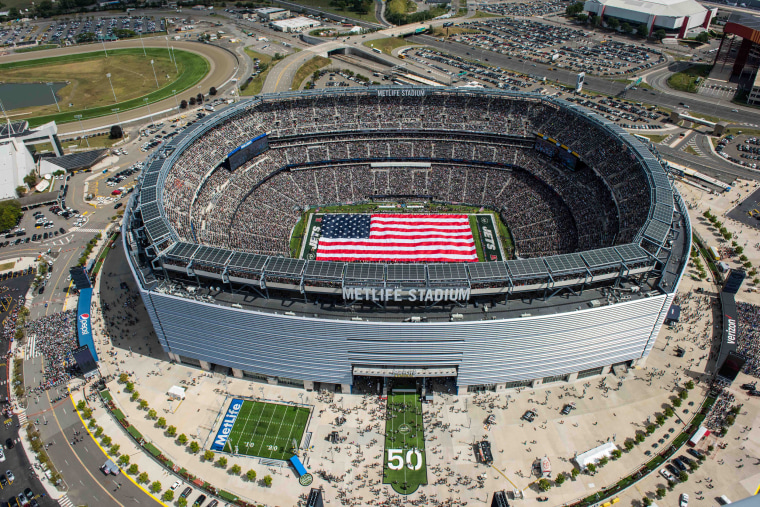Now that the United States, Canada and Mexico have won their joint bid to host the 2026 soccer World Cup, a new contest begins.
If organizers stick to their plans, seven of the 23 proposed host cities won't make the cut. So with eight years to go before kickoff, 23 major cities were already lining up Wednesday to explain why they should be invited to the party.
"Los Angeles is the world's greatest sports town — and it embodies the spirit of diversity, inclusion and international cooperation that the World Cup represents," Mayor Eric Garcetti said Wednesday.
Nashville, Tennessee, "will be ready to host the world's best soccer players and fans eight years from now," Mayor David Briley said.
Kansas City, Missouri, Mayor Sly James told NBC affiliate KSHB: "Once they get here, I think the city will sell itself."
Leaders of many of the 20 other proposed cities sang from the same hymnal, certain that their towns would be perfect hosts.
FIFA, the sport's world governing body, indicated that it believes that they're all correct, reporting to voters that all of the proposed cities offer top-of-the-line stadiums, hotels and facilities.
However, a cutoff decision isn't expected until 2021 and possibly not until after the 2022 World Cup final round in Qatar, U.S. and international soccer authorities said. So until then, the proposed host cities — 17 in the United States and three each in Mexico and Canada — can only sit, wait and argue, argue, argue.
"It's a high-class problem," Carlos Cordeiro, president of U.S. Soccer, the sport's governing body in the United States, said in a conference call with reporters.
"We're blessed with 23 really world-class facilities [and] stadiums, some iconic, some brand-new, cutting-edge and everything in between," Cordeiro said. "I think it will be a very difficult decision that we will all have to make, the three of us in conjunction with FIFA, when we have to determine the final 16."
The competition is fueled in big part by the mammoth success of the 1994 World Cup in the United States, which was the best attended and one of the most profitable ever. The tournament is estimated to have delivered overall profits of $1.45 billion — almost $620 million of that to Los Angeles, where the final was played in nearby Pasadena.
FIFA has called the 1994 tournament the most successful soccer event of any kind in history. And that was when the tournament featured only 24 teams and 52 matches. The 2026 tournament will feature 48 teams and 80 matches.
"It's going to be a Big Gulp — it'll be supersized," said Roger Bennett, co-host of the "Men in Blazers" soccer podcast and its companion "Men in Blazers Show" on NBC Sports Network.
That assumes, of course, that the so-called 60-10-10 division — 60 matches scheduled in the United States and 10 each in Canada and Mexico — isn't altered, Bennett said in an interview.

That's still "not entirely clear," Bennett said. "There may be some finagling, some tweaking, so to speak. FIFA loves to tweak."
The groundwork has already been laid. Seven of the 17 U.S. cities hosted matches at the U.S.-organized World Cup in 1994, six of the others now have pro teams in Major League Soccer, and two of the rest will have MLS teams by the time the tournament rolls around. The others all boast big-time pro sports and stadiums to match.
Mexico, meanwhile, is one of the biggest soccer countries in the world, and it has already hosted two World Cups. And Canada hosted the 2015 Women's World Cup. So none of the candidates is likely to be out of its depth.
"The process will take into consideration various criteria — the cost of renting the stadium, whether the stadium has turf or artificial [turf], the number of seats and size of the stadium, the location of the stadium, time zones for [kickoff] times," Dan Flynn, chief executive and secretary general of U.S. Soccer, said in an interview.
"And equally, if not more important, is the city itself — its background, its commitment to build a level of exposure and enthusiasm," Flynn said. "But ultimately, it's FIFA's decision."
Carlos Bocanegra, a member of both the U.S. Soccer board and its 2026 bid campaign, said in an interview that FIFA would also take into account "the level of enthusiasm."
"What's the soccer culture like in that town?" asked Bocanegra, vice president of Atlanta United FC in MLS and a member of the 2006 and 2010 U.S. World Cup teams.
Steve Reed, president of the Canadian Soccer Federation, acknowledged, "There's going to be some disappointments, unfortunately."
"But, hopefully, we can have the most successful World Cup of all time and it needs all people from all three of our countries," Reed told reporters Thursday.
Mexican President Enrique Peña Nieto concurred that, whatever their differences may be today, cooperation won't be a problem.
"Football knows that Canada, the United States and Mexico are deeply united," Peña Nieto said in a video statement.
Here are the 23 cities that will fight it out for the remaining 15 coveted spots:
United States
- Atlanta
- Baltimore
- Boston (1994 host city)
- Cincinnati, Ohio
- Dallas (1994 host city)
- Denver
- Houston
- Kansas City, Missouri
- Los Angeles (1994 host city)
- Miami
- Nashville, Tennessee
- New York-New Jersey (1994 host city)
- Orlando, Florida (1994 host city)
- Philadelphia
- San Francisco (1994 host city)
- Seattle
- Washington (1994 host city)
Canada
- Edmonton (2015 Women's World Cup host city)
- Montreal (2015 Women's World Cup host city)
- Toronto
Mexico
- Guadalajara (1970, 1986 host city)
- Mexico City (1970, 1986 host city)
- Monterrey (1986 host city)



